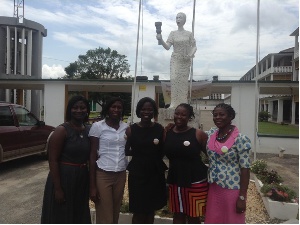The number of female students taking up careers in agricultural sciences in Ghana has over the years dwindled, mainly due to non-mechanised agriculture in the country. Most students dream of only pursuing careers in conventional sciences such as medicine, pharmacy, and usually view careers in agricultural sciences as punishment due to the traditional mode of farming-use of hoe and cutlass. However, women in Ghana are the forefront of agricultural processing and management in the informal sector, ensuring Ghana achieves food security.
As part of the efforts to educate young students about the career prospects in agricultural sciences, African Women in Agricultural Research and Development (AWARD) organised a role modelling event on the theme Raising Female Scientists for the Next Generation for students at the Wesley Girls High School in Cape Coast.
The acting assistant headmistress in charge of administration of Wesley Girls High School, Beatrice Agyapong-Boamah says students view of careers in agricultural sciences is very limited.
In a short survey conducted during the AWARD event among over 100 students in the school, only one student showed interest in pursuing career in agricultural sciences-due to the fascination of work a family member does at Council for Scientific and Industrial Research (CSIR) of producing crop varieties in the laboratory.
“For most of the students when they hear agriculture it has to do with hoe and cutlass. But it goes beyond that where scientists are now developing improved crop varieties, as well as conducting research to correct some problems in agriculture,” Agyapong-Boamah added.
Owusu Erika, a student of Wesley Girls High School says the programme changed her mind-set of agriculture from backyard farming to researching of diseases that affects plants and animals and developing measures to address them.
Another student, Sylvia Serwah Oppong said the programme enlightened her view on different career choices in agricultural sciences such as research to improve agricultural products.
“The programme was very educative and I was personally inspired to try to do more than I am doing right now,” stated Ali Priscilla, of Wesley Girls High School, which is noted for producing lots of female scientists in the country.
AWARD leads the way
AWARD is a professional development program which seeks to strengthen the research and leadership skills of African women in agricultural science, empowering them to contribute more effectively to poverty alleviation and food security in sub-Saharan Africa.
Mavis Owureku-Asare, 2013 AWARD Fellow says the programme is geared towards passing on knowledge gained during the fellowship to younger females pursuing science through creating the awareness of the various career opportunities in agricultural sciences.
“We hope the students will think in a broader perspective, so that they do not narrow themselves to careers in conventional sciences that we know, but there are other options in agricultural sciences like, food science, horticulture, to pursue to have a fulfilling career,’’ she said.
Mavis Owureku-Asare, also a research scientific officer at Biotechnology and Nuclear Agriculture Research Institute (BNARI) said 4 H club, which is equivalent to that of 4 H in the United States will be formed in the school to empower the youth by offering them the practical aspects of agricultural sciences.
Building leadership skills
A food research scientist at BNARI and AWARD Mentee, Joyce Agyeiwaah-Amponsah stated that AWARD in the long term seeks to empower the students to gain leadership abilities and transfer the knowledge they will have in future to other junior scientists to aspire to become agricultural scientists, especially women.
Margaret Owusu, food research scientist at BNARI and 2013 AWARD fellow also says the programme hopes to impact the younger generation with the leadership skills required in agricultural sciences to achieve food security in sub Saharan Africa.
“The AWARD specifically focuses on female prospective scientists which empowers women in agricultural research and development to contribute more effectively in alleviating poverty in ensuring food security,’’ Margaret Owusu said.
Mechanised farming
Ghana is ready for mechanised agriculture, we have the resources such as manpower, land, it is just changing our mind-set that we can do it, Joyce Agyeiwaah-Amponsah said.
According to her funding in agriculture is a challenge, but to be able to feed the country is based on sound policies that support agriculture, “although we have a challenge we hope government will appreciate it in the near future by empowering the women in the sector to increase output,’’ Joyce Agyeiwaah-Amponsah says.
Agriculture can do a lot for Ghana, but through the developed form of it, which we need to sustain to address food insecurity, the assistant headmistress of Wesley Girls High School,Ayapong-Boamah also said.
Matilda Dzomeku, research scientist at Food Research Institute-CSIR is of the view that in the long term, the students would venture into other fields of agricultural sciences and tackle food losses, agricultural waste management, among others to provide food security in Ghana.
“More men are found pursuing sciences at the university level, AWARD seeks to bridge the gap of having more women in sciences in the university,” the 2013 AWARD fellow emphasised.
AWARD Fellows benefit from a two-year career development program focused on establishing mentoring partnerships, building science skills, and developing leadership capacity. The fellowships are awarded on the basis of intellectual merit, leadership capacity, and the potential of the scientist's research to improve the daily lives of smallholder farmers, especially women.
AWARD was established in 2008 and is funded by the Bill & Melinda Gates Foundation and the United States Agency for International Development (USAID). It is a project of the Gender & Diversity Program of the Consultative Group on International Agricultural Research (CGIAR). AWARD currently has 250 African women working in agricultural research and development from Ethiopia, Ghana, Kenya, Liberia, Malawi, Mozambique, Nigeria, Rwanda, Tanzania, Uganda and Zambia.
Regional News of Thursday, 5 June 2014
Source: Samuel Hinneh













